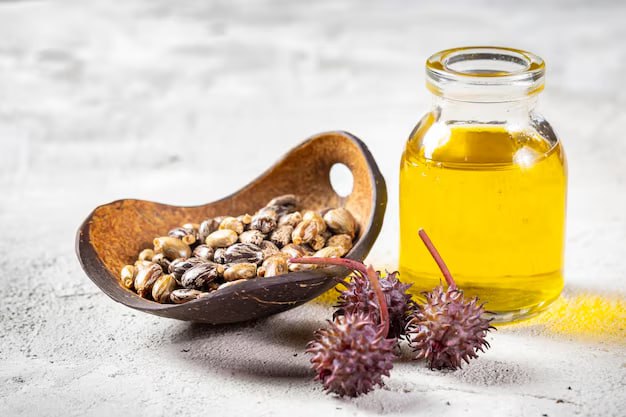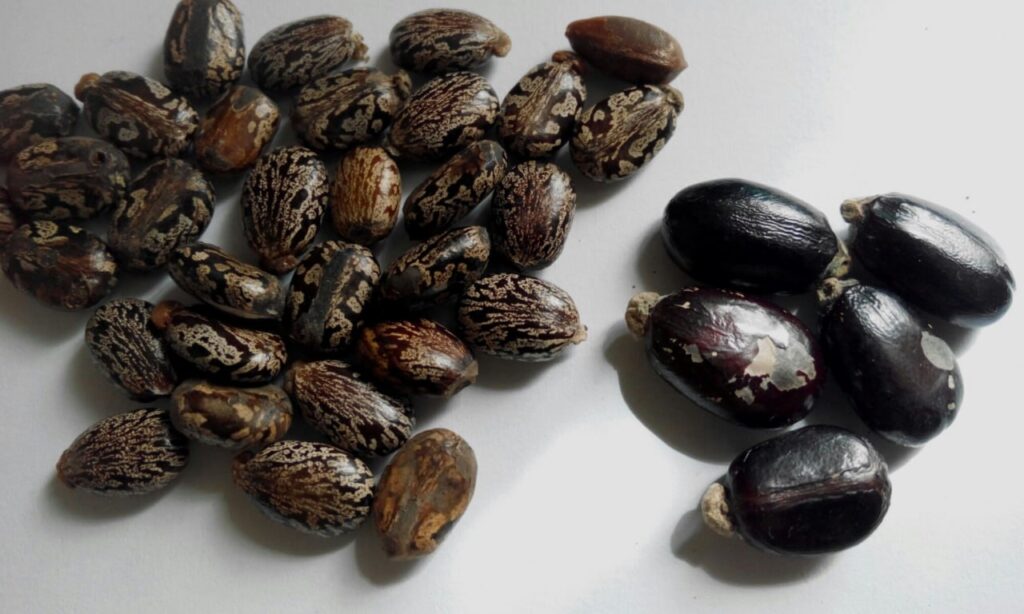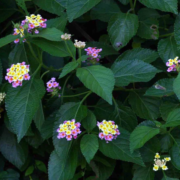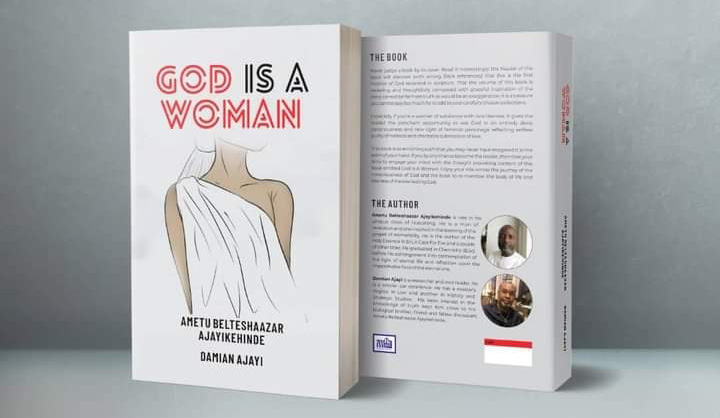Castor Oil: Maguta ma Mbariki

Author and administrator of Gĩkũyũ Centre for Cultural Studies, Kĩgongona…
The Mwariki tree, Ricinus communis, is known in English as the Castor oil tree and is said to be native to Africa and India. It grows to about 10 to 15 feet and is seen in many rural homesteads all over Kenya as it grows wildly and is literally impossible to eradicate from a homestead. Traditionally it was used by the Gikuyu women to produce oil, Maguta ma Mbarīki, an oil that they treasured as a skin conditioner and for many other healing purposes. The seeds from which the oil is extracted are called Mbariki and are the size of a thumbnail. They look like ticks without the legs. The seed has a hard smooth skin and has to be crushed in order to reach the oily interior. It is not as hard as the macadamia seed and can be crushed between the thumb and fore finger. A fact sheet of the tree is available here and factual information about it is readily available on the internet.
To understand the process of oil extraction from the seeds I visited an old lady friend who took me through the steps. When the seeds have been collected they are roasted while still in their shells on a piece of broken pot, rugio, much like roasting peanuts is done today on a frying pan. The roasted seeds are then wrapped in a leather skin garment, (one without hair), and beaten with a stick so that they are crushed to a paste. The paste is then placed into a pot, Nyungu and water added to nearly full. This is then placed on the fireplace, riko and cooked for several hours.
The oil floats on the water and is then carefully drained onto a calabash and then into an oil storage container, Kinandu. The oil is drained as a clean extra virgin grade 1 first and a less pure grade containing some crushed shells finally. This second grade is used to soften all the leather clothes and leather carrying straps, mioho and mikwa. They are spread out in the sun to dry and they become wonderfully soft and shiny. The grade 1 oil is stored for toning the skin, hairdressing and other ceremonies. To leave a pot of cooking castor oil unattended was taboo. This is understandable as the Gikuyu woman’s dwelling, Nyumba was highly flammable and the cooking of this oil a high-risk affair.
MUKUYU: Did you also use the oil from a sheep to tone your skin?
Here the woman informant looked shocked and disbelieving. In fact her reaction can only best be described if we revert to the original language in which the conversation was held, Gikuyu. Essentially she explained that she was not a man to go smelling like an animal and without mincing words made it clear that men are animals and that it was for this reason that they smear animal fat on themselves. Women, according to her can only ingest animal fat but for beauty purposes, a woman’s oil is castor oil. I followed up this question asking her whether men could use castor oil and again she made it very clear that my generation was very ignorant and I should not tire her with further stupid questions. I later learnt I was treading on extremely slippery ground as castor oil was central in the management of menstrual issues like pains and flow volume.
After a long silence in which I pictured her as a young woman pounding on a mortar with a pestle, I began to see many things that were hidden to a speaking questioner.
I sat still. I saw the old grinding stone, now decommissioned, resting under the eaves of her house just near the castor oil plant and suddenly the whole thing became clear and I almost shouted for joy.
I remembered Professor Wangari Maathai and her concern for the environment and especially trees. I recalled the legendary, Wang’ombe wa Ihura from Mathira and his reputed wealth in cattle and I remembered Mzee Jomo Kenyatta’s fly whisk and Colobus monkey ceremonial garment, Githii.
Yes! According to Gikuyu interpretation of life, men are the guardians of the animal kingdom and women are the guardians of the plant kingdom. That is why men use animal fat and love animals, mahiu. That is why women love and revere the plant kingdom, mimera.
Woman, Mumbi was first as a settled sedentary being at the original home, Mukurwe wa Nyagathanga. She was the personification of the Creator, Mumbi, and also the personification of the earth itself, the original potter, Mumbi or Gaia. The Man, Gikuyu, joined her later from his wanderings. He was the domesticator of animals and all domestic animals, mahiu belong to him. Wild animals according to Gikuyu mythology belong to the woman. It is likely that the Gikuyu myth of origin is a coded history of their shift from hunter gatherers and pastoralists into a settled sedentary lifestyle. We are told that the Greek God of the Harvest, the fertility of the earth and agriculture, is Demeter, a woman. This is the Gikuyu Mumbi.

*****
The Benefits of Castor Oil for Human Health and Well-being (By Msingi Team)
Castor oil, derived from the seeds of the Ricinus communis plant, has been used for centuries in traditional medicine for its diverse health benefits. This thick, pale-yellow oil is packed with ricinoleic acid, a unique fatty acid that gives it powerful medicinal properties. Below are some of the key benefits of castor oil for human health and wellness.
1. Promotes Healthy Skin
Castor oil is widely used in skincare due to its moisturizing, anti-inflammatory, and antimicrobial properties. It helps to:
Hydrate dry skin by locking in moisture.
Soothe skin conditions like eczema and psoriasis.
Reduce acne by fighting bacteria and reducing inflammation.
Heal wounds and minor cuts by promoting tissue regeneration.
2. Enhances Hair Growth and Scalp Health
Castor oil is a popular natural remedy for hair care. Its high content of ricinoleic acid and other nutrients nourishes the scalp and promotes hair growth by:
Increasing blood circulation to hair follicles.
Moisturizing and preventing dandruff.
Strengthening hair strands and reducing breakage.
3. Relieves Constipation
One of the most well-known uses of castor oil is as a natural laxative. When taken orally, it stimulates bowel movements by increasing muscle contractions in the intestines, making it an effective remedy for short-term relief of constipation. However, it should be used with caution and in moderation to avoid dependency.
4. Boosts Immunity and Fights Infections
Castor oil has been shown to support the immune system by enhancing the production of white blood cells, which help fight infections. Its antimicrobial properties also make it useful in treating minor skin infections and wounds.
5. Reduces Inflammation and Eases Joint Pain
Due to its anti-inflammatory properties, castor oil is commonly used in massage therapy to relieve arthritis, joint pain, and muscle soreness. Applying warm castor oil packs to affected areas can help reduce swelling and improve mobility.
6. Supports Eye and Eyelash Health
Castor oil is often used as a natural remedy for dry eyes and eyelash growth. Applying a small amount to the eyelashes can help them grow thicker and stronger, while using it as an eye drop alternative (under medical guidance) can help relieve dryness.
7. Aids in Detoxification
Castor oil packs are used in traditional medicine to support liver health and detoxify the body. When applied to the abdomen, they are believed to improve circulation, lymphatic drainage, and digestion.
Precautions and Considerations
While castor oil is beneficial, it should be used carefully: Oral consumption should be in controlled amounts due to its strong laxative effect. Pregnant women should avoid using it internally as it may induce labor.
Allergic reactions are rare but possible, so a patch test is recommended before topical use.
Conclusion
Castor oil is a versatile natural remedy with numerous benefits for skin, hair, digestion, immunity, and pain relief. Whether used topically or internally, it remains a valuable addition to holistic health and wellness routines. However, it should be used with caution and in consultation with a healthcare professional when necessary.
What's Your Reaction?
Author and administrator of Gĩkũyũ Centre for Cultural Studies, Kĩgongona kĩa Ũũgĩ wa Bũrũri Witũ. A modern Gĩkũyũ Shaman and Priest after the order of Melchizedek. A Mũnjirũ wa Mbarĩ ya Kĩragũ.

















